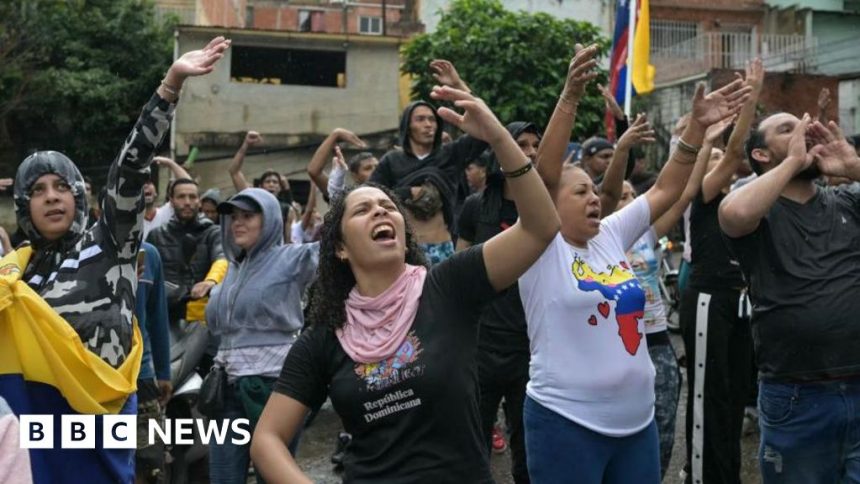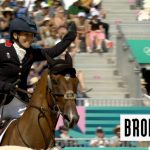Caracas echoes with loud protests against Venezuela’s disputed election result
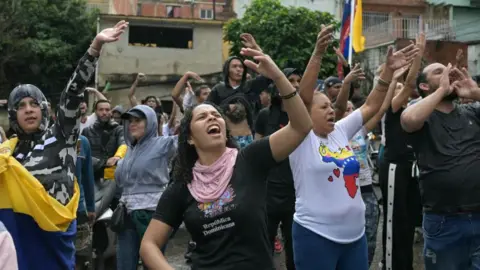 Getty Images
Getty ImagesPeople in Caracas have been banging pots and pans from their homes and on the streets in protest against Venezuelan President Nicolás Maduro’s claim of victory in the country’s disputed election.
Crowds of people have been making their way, by foot, to Miraflores – the presidential palace – in protest.
People are walking from some of the slums around the city.
One group stood outside in the pouring rain to bang pots and pans and chant “Afuera” (Out) and “Libertad” (Freedom).
Others posted pictures of the crowds on social media with captions including “knock down the dictator” and “everyone to Miraflores”.
Footage showed tyres burning on highways and large numbers of people on the streets, on foot and on bikes.
The opposition has disputed Mr Maduro’s declaration of victory as fraudulent, saying its candidate Edmundo González won convincingly with 70% of the vote.
Opposition parties had united behind Mr González in an attempt to unseat President Maduro after 11 years in power, amid widespread discontent over the country’s economic crisis.
Opinion polls ahead of the election suggested a clear victory for the challenger.
A number of Western and Latin American countries, as well as international bodies including the UN, have called on the Venezuelan authorities to release voting records from individual polling stations.
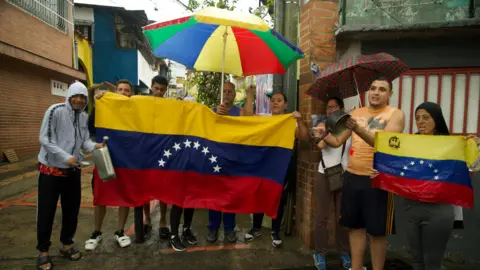
The BBC spoke to a number of people who attended one protest in a densely-populated area known as La Lucha, meaning “the fight”.
Paola Sarzalejo, 41, said the vote was “terrible, fraud. We won with 70%, but they did the same thing to us again. They took the elections from us again.
“We want a better future for our youth, for our country.”
Her father Miguel, 64, agreed, saying: “He lost the elections, he has no right to be there right now.”
He added: “We want a better future for the youth because if not they will leave the country. One where they can work well and earn well. We have a rich country and he is destroying everything.
“If the youth all leave, only old people will be left in Venezuela, only senior citizens.”
Cristobal Martinez, draped in a Venezuelan flag, said he thought the election was a “fraud”.
He said most young people in La Lucha and surrounding areas had voted in an election that was particularly important for young people as “many of us are unemployed” and “the majority do not study”.
“It was the first time I have voted in my life. I was there from six in the morning until approximately nine in the morning and I saw a lot of people mobilising in the street.
“There was a lot of discontent towards the government. The majority of people were participating for change.”
He said that while President Maduro had been in office for a long time there had not been “any change” and it had been “worse since President Chavez died”.
He accused some older people who sympathised with the government of living off bonuses or food handouts whereas “we want a change, we want decent jobs, a good future for our country”.
Mr Martinez said he wanted “people from other countries to help us… so that a disaster doesn’t happen like in previous times”.
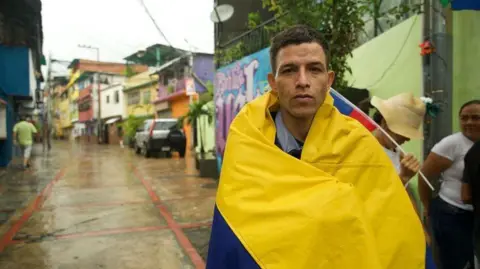
President Maduro has accused the opposition of calling for a coup by disputing the results. “This is not the first time we are facing what we are facing today,” he said.
“They are trying to impose in Venezuela a coup d’etat again of fascist and counter-revolutionary character.”
The Venezuelan attorney general warned that the blocking of roads or breaking any laws related to disturbances as part of protests would be met with the full force of the law and that 32 people had been detained on accusations ranging from destroying electoral materials to sparking acts of violence.
Meanwhile, US senior administration officials said that the announced result “does not track with data that we’ve received through quick count mechanisms and other sources, which suggests that the result that was announced may be at odds with how people voted”.
That was “the principal source of our concern”, they added.
“That is why we are asking the Venezuelan electoral authorities to release the underlying data that supports the numbers that they have publicly announced.”
However, the US has not yet been drawn on what the result means for their sanctions policy towards Venezuela. Officials have emphasised that while they have doubts about the result, President Maduro did call an election and allow an opposition candidate to be on the ballot paper – even if the opposition leader was banned from running.




